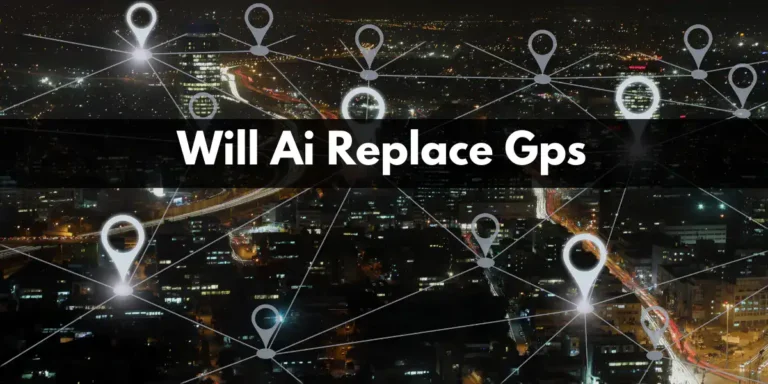As technological advancements continue to revolutionize the financial industry, many wonders if AI will replace financial analysts. In this post, we’ll explore the following:
- The future impact of AI on the Role of financial analysts
- Discuss whether it’s time for professionals in this field to start embracing this new technology.
- The future of financial analysts in the AI-driven era.
- Advantages and disadvantages of using AI in this sector.
Read on to find out more.

Will AI Replace Financial Analysts?
No, AI is unlikely to replace financial analysts completely. While AI technology can assist in certain tasks, such as improving accuracy and efficiency, aspects of financial analysis still require human judgment and intuition.
Financial analysts who adapt and incorporate AI into their work will remain valuable.
What Impact Will AI Have On The Job Market For Financial Analysts?
Automation and Efficiency in Financial Analytics
One of the most significant impacts of AI on financial analyst jobs is the automation of data collection, analysis, and reporting processes.
This automation will free up time for financial analysts to focus on more complex tasks that require human skills and judgment, improving financial analytics overall.
However, this increased efficiency and automation may also lead to job cuts as machines take over routine tasks previously performed by human analysts.
Susceptibility of White-Collar Jobs
While AI will impact various sectors, white-collar jobs, including financial analysts, may be most susceptible to the technology’s spread into the economy.
Higher-wage jobs are expected to have a higher exposure to AI-based technology, making them more vulnerable to job cuts resulting from automation and increased efficiency.
Potential Disruption in Job Market
According to a Goldman Sachs study, AI could significantly impact 66% of the job market, leading to a “significant disruption” in the job market.
The study estimates that generative AI could impact 300 million full-time jobs worldwide, suggesting that AI’s impact could also be significant in the financial job market.
Therefore, financial analysts need to adapt and acquire new skills to remain relevant in the job market.
Future Employment Opportunities
Despite the expected changes in the financial job market due to AI, financial analyst positions are expected to provide good employment opportunities for the foreseeable future.
According to the Bureau of Labor Statistics, there is an expected need for 38,400 financial analysts over the next ten years.
As AI advances, financial analysts must adapt their skills and knowledge to remain competitive in the job market.
What Skills Will Financial Analysts Need In A World With AI?

Analytical Thinking
One of the key skills that financial analysts will need in a world with AI is analytical thinking.
According to the World Economic Forum’s Future of Jobs Report 2023, 60% of workers will require additional training by 2027, with the biggest priority being analytical thinking.
Financial analysts must examine quantitative and qualitative data to find trends, patterns, and insights.
They must also analyze data and offer knowledgeable recommendations.
Data Literacy
Financial analysts must be data-literate. They must read, write, and present data in context, grasp data sources and constructions and use analytical methodologies and approaches.
Use-case application and business value. They must manage enormous databases and use data visualization tools to simplify difficult data.
Technical and Mathematical Skills
In addition to data literacy, financial analysts will need to have a range of technical and mathematical skills.
They will need to have experience using algebra and statistics to conduct statistical analysis and financial modeling.
They will also need to be familiar with technology and software, such as Excel, Python, and SQL.
Financial analysts will need to understand how to use these tools to manipulate, organize, and analyze data.
Soft Skills
In a world with AI, soft skills will be just as important as technical skills. Financial analysts will need to be able to work collaboratively with other departments and teams.
Financial analysts should be able to communicate their findings effectively through written and verbal communication.
They will also need to work efficiently in a team environment, using communication skills to align and sync with multiple people and teams to keep progressing efficiently.
Openness to Change
People will need to alter to keep up, especially as technology develops at an increasingly rapid pace.
Financial analysts will need to be receptive to learning new techniques and technologies, as well as flexible in their approach to work.
They will have to accept change and seize the chance to advance themselves.
Upskilling
Financial analysts will need to continuously upskill to keep up with the rapid pace of technological change.
Critical skills include cloud computing, cybersecurity, data analysis, and software development.
By upskilling, financial analysts can stay ahead of the curve and remain relevant in an increasingly competitive job market.
What Is The Future Of Financial Analysis With AI Technology?

Changing the Way Financial Institutions Utilize Data Insights
EY and Invesco have supported a study that suggests AI is transforming how financial institutions gather and use data.
This, in turn, is creating new forms of business model innovation and changing competitive environments and workforces.
The study also indicates that AI is introducing new risk dynamics and presenting unique challenges for firms and policymakers to address.
The integration of AI into financial analytics has also been demonstrated to be beneficial, with 70% of financial services firms using machine learning to predict cash flow events and fine-tune credit scores.
Extended Planning and Analysis (xP&A)
One major trend in the future of financial analysis is the use of extended planning and analysis (xP&A), which leverages AI and automation to augment human intelligence and drive better outcomes.
Business leaders who embrace integrated planning alongside artificial intelligence and automation are more likely to thrive in the future.
By utilizing AI in financial analysis, institutions can optimize their planning and decision-making processes to enhance performance and increase profitability.
What Are The Advantages Of Using AI In Financial Analysis?

Improved accuracy and speed
AI-powered financial analysis tools can process vast amounts of data quickly and accurately.
This helps to identify patterns, anomalies, and trends that would otherwise go unnoticed.
AI can also analyze data in real time, enabling businesses to respond to market changes faster and more efficiently.
This speed and accuracy result in more informed decision-making and can lead to better financial outcomes.
Reduced costs
The automation of tasks, such as data entry and analysis, can significantly reduce employment costs for financial institutions.
AI systems can work 24/7 without taking breaks or vacations, which makes them more cost-effective than human employees.
Moreover, AI tools can handle mundane tasks, freeing up time for human employees to focus on more complex and strategic tasks.
Better risk management
Minimizing risk is one of the key objectives of financial institutions. AI can assist with risk management by spotting potential fraud, drawing attention to out-of-the-ordinary transactions, and forecasting market movements.
AI may also examine past data to find trends and patterns that can be used to forecast dangers in the future. This proactive approach to risk management can stop financial losses and enhance a financial institution’s overall performance.
Personalized customer service
AI-powered financial analysis tools can personalize customer experiences by providing customized recommendations, insights, and advice.
This helps build customer trust and loyalty and provides a competitive advantage for financial institutions. Personalized customer service can also help businesses identify new revenue growth opportunities.
Increased efficiency and productivity
AI-powered financial analysis tools can automate repetitive tasks, freeing up time for human employees to focus on more complex tasks.
This results in increased efficiency and productivity, which can lead to better financial outcomes. Additionally, AI can help businesses identify inefficiencies and streamline processes, increasing efficiency and productivity.
What Are The Disadvantages Of Using AI In Financial Analysis?
Job Loss Concerns
One of the primary concerns of using AI in financial analysis is the potential loss of jobs. The automation of many tasks can result in job redundancy, particularly for routine jobs.
This can impact the workforce negatively and lead to job insecurity for many individuals. However, proponents of AI argue that it can also create new job opportunities in areas such as data science, engineering, and programming.
High Implementation Cost
AI technology implementation necessitates a large time, financial, and resource commitment.
Small and medium-sized firms may find it difficult to implement AI since they lack the necessary financial resources. Additionally, it might call for intensive employee training and development, which can be expensive for businesses.
Lack of Emotion and Creativity
The inability of AI to articulate emotions and conceive creatively can be a drawback while performing financial analysis.
This implies that it might not be able to form judgments based on feelings or intuition, which might be crucial in some circumstances.
However, AI can be taught to make judgments based on patterns, which can improve consistency and accuracy.
Data Privacy and Security Concerns
Large amounts of data must be accessed in order to apply AI for financial analysis, which poses serious dangers to data security and privacy.
When dealing with sensitive financial data that may be subject to cyberattacks or other security flaws, this can be very problematic.
Therefore, it is crucial to put in place strong security measures in order to reduce the risks related to the use of AI in financial analysis.
Lack of Accountability
AI is capable of making conclusions based on patterns and data, but it might not be able to explain those decisions in detail.
In financial analysis, where accountability is vital, this might be a major challenge. To ensure that judgments made by AI are open and accountable, it is crucial to set explicit rules and norms.
FAQs
How Is AI Currently Used In Finance?
AI is currently being used in finance to automate tasks, analyze large amounts of data, and make predictions.
For example, AI algorithms can be used to detect fraud, evaluate credit risk, and optimize investment portfolios.
What Are The Benefits Of Using AI In Finance?
AI can improve financial analytics and help fill gaps in financial services offerings.
It can also increase efficiency, reduce costs, and make investment decisions more accurate.
What Are The Potential Drawbacks Of Using AI In Finance?
One potential drawback of using AI in finance is the possibility of bias in the algorithms.
Additionally, there may be concerns about privacy and security when AI systems process sensitive financial data.
How Can Financial Analysts Adapt To The Rise Of AI?
Financial analysts can adjust to the rise of AI by learning new skills like programming and data analysis and concentrating on tasks that still require human judgment, like giving clients tailored financial advice.
What Is The Job Outlook For Financial Analysts In The Future?
The Bureau of Labor Statistics predicts that employment of financial analysts will increase by 5% between 2020 and 2030, roughly at the same rate as the national average for all occupations.
Financial analysts are still anticipated to be in demand as people and companies continue to seek guidance on investment decisions, even though AI may change some aspects of the work.
Conclusion
While AI has the potential to impact the finance industry significantly, financial analysts are not likely to be entirely replaced by AI.
AI currently lacks human analysts’ critical thinking and decision-making skills, despite the fact that it can digest vast volumes of data and offer insightful analyses.
Therefore, rather than completely replacing financial analysts, AI is more likely to be used to support them.




